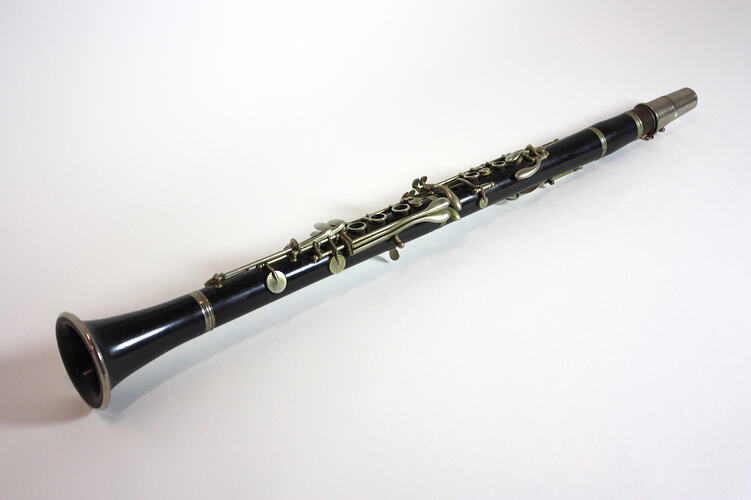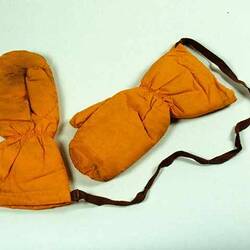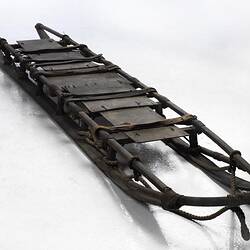Summary
Clarinet played by Dr Philip Law on Antarctic expeditions. The clarinet is part of Museum Victoria's collection of artifacts from the post-war era of scientific exploration of Antarctica.
The clarinet is inscribed 'Romeo Orsi', the name of an Italian clarinet player and, from 1880, a musical instrument maker with Paolo Maino.
Dr Law explained in 1999: 'The Law family had a tradition of teaching themselves music. I had an elder brother who taught himself to play about five different instruments and was a professional musician as well as a schoolteacher for many years. I earned my way through university playing saxophone. My main instrument was clarinet, but I taught myself piano. Because I didn't own a piano, I then bought a piano accordion, which I used on every voyage to provide music for the blokes, with singalong sessions.' (Australian Academy of Science web site)
Law was attracted to jazz music in his teens, which Qulity and Lugg (2013) describe as 'setting the scene for later Antarctic musical activities'. His grandfather 'had initiated him to rhythm on the bones and spoons and he had picked up the elements of playing the tinwhistle and mouth organ in primary school. Late in high school, he was given in succession a piccolo and a clarinet, both of which widened his musical horizons'; his first key musical role was as drummer in Geof 's Hamilton High School Jazz Band. Law returned to the clarinet when he realized that the time it took to pack up his kit might be better spent socializing with girls. Later, as a teacher posted to Clunes, in regional Victoria in 1933, Law continued to play jazz while pursuing his university education.
Dr Law's piano accordion is also held by Museums Victoria: SH 940537. His B flat soprano saxophone is held in the collection of the Australian Jazz Museum, which describes him as a 'dedicated jazz reed player'.
Physical Description
Black wood clarinet with silver metal keys. Separates into five pieces with silver metal mouth piece cap. Mouth piece and barrel sections do not separate easily. Reed at mouthpiece, with slight loss on thin edge. Mouthpiece of different wood, and therefore probably a replacement.
Significance
Phillip Law was the first Director of the Antarctic Division of the Commonwealth Department of External Affairs, now the Australian Antarctic Division of the Commonwealth Department of Environment and Heritage. Under Dr Law's Directorship Australia established a permanent presence in Antarctica.
Joining the Australian National Antarctic Research Expedition (ANARE) in 1947, Dr Law was appointed Director of the newly-formed Division in 1949, a post he held until his retirement in 1966. He was instrumental in the development of the Antarctic Division and the ANARE programs and led the expeditions that established Australia's three Antarctic stations: Mawson in 1954; Davis in 1957; and Casey in 1964.
The clarinet was played by Dr Law on various Antarctic expeditions. Playing music was an important recreation for expeditioners as there was no readily available recorded music or radio.
More Information
-
Collection Names
-
Collecting Areas
-
Acquisition Information
Donation from Dr Phillip G. Law AC CBE - Australian Antarctic Division, 31 Aug 2006
-
Original Owner
-
Manufacturer
-
Place Used
-
Inscriptions
Impressed on mouthpiece: '-S-'. Impressed on barrel: 'Romeo Orsi [?] / MILAN'. Impressed on upper tube: 'MADE IN ITALY'.
-
Classification
-
Category
-
Discipline
-
Type of item
-
Object Dimensions
670 m (Length), 77 m (Width)
-
References
'Dr Phillip Law (1912-2010), Antarctic explorer', interviewed by Professor John Swan, 1999, Australian Academy of Science web site [Link 1] accessed 5/6/2019. Patrick G. Quilty and Desmond J. Lugg, 2013. 'Phillip Garth Law 1912-2010', Historical Records of Australian Science, 2013, 24, 134-159, [Link 2] accessed via [Link 3] 5/6/2019. Wind Instruments Collection Museum: 'Orsi' - [Link 4] accessed 12/6/2019. Orsi Wind Instruments, [Link 5] accessed 12/6/2019.
-
Keywords


